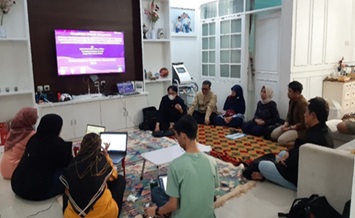Pelatihan Knowledge Management System Penanganan Anak Down Syndrome Bagi Pengurus Persatuan Orang Tua Anak dengan Down Syndrome Jawa Barat
Training on the Knowledge Management System for Handling Children with Down Syndrome for the Management of the Association of Parents of Children with Down Syndrome West Java
DOI:
https://doi.org/10.33084/pengabdianmu.v10i2.8786Keywords:
Down Syndrome, Knowledge Management, POTADSAbstract
Children with Down Syndrome face various physical challenges, such as muscle weakness, vulnerability to illnesses, and lower IQ levels compared to typical children. These conditions require special attention from parents, who must learn how to handle and care for children with Down Syndrome from an early stage. However, many parents struggle to access adequate information and knowledge about caring for their children. This community service program aims to implement a Knowledge Management System (KMS) as a solution for handling children with Down Syndrome within the Association of Parents of Children with Down Syndrome (POTADS) in West Java. The program involves training and mentoring for POTADS administrators. Based on the evaluation results, the administrators of POTADS West Java have successfully utilized the KMS.
Downloads
References
Anggreni, N. M. D. A. dan Valentina, T. D. (2015) Penyesuaian Psikologis Orangtua Dengan Anak Down Syndrome, Jurnal Psikologi Udayana, 2(2), hal. 185–197. http://dx.doi.org/10.24843/JPU.2015.v02.i02.p07
CDC (2019) Facts about Down Syndrome. Tersedia pada: https://www.cdc.gov/ncbddd/birthdefects/downsyndrome.html (Diakses: 27 Agustus 2019).
Fadhil Dzil Ikrom Al Hazmi, D. et al. (2014) Kombinasi Neuro Developmental Treatment Dan Sensory Integration Lebih Baik Daripada Hanya Neuro Developmental Treatment Untuk Meningkatkan Keseimbangan Berdiri Anak Down Syndrome, Sport and Fitness Journal. https://www.esaunggul.ac.id/kombinasi-neuro-developmental-treatment-dan-sensory-integration-lebih-baik-daripada-hanya-neuro-developmental-treatment-untuk-meningkatkan-keseimbangan-berdiri-anak-down-syndrome/
Hasanah, N. U., Wibowo, H. dan Humaedi, S. (2016) Pola Pengasuhan Orang Tua Dalam Upaya Pembentukan Kemandirian Anak Down Syndrome, SHARE : Social Work Journal, 5(1). https://doi.org/10.24198/share.v5i1.13119
Megasari, I. dan Kristiana, I. F. (2017) Hubungan Antara Dukungan Sosial Suami dengan Penerimaan Diri pada Ibu Yang Memiliki Anak Down Syndrome di Semarang, Empati, 5(4), hal. 653–659. https://doi.org/10.14710/empati.2016.15426
Mulia, A. dan Kristi, E. (2012) Fasilitas Terapi Anak Down Syndrome di Surabaya, JURNAL eDIMENSI ARSITEKTUR, 1(1), hal. 1–6. https://publication.ppsi.petra.ac.id/index.php/teknik-arsitektur/article/view/318/258
Rachmawati, S. N. dan Masykur, A. M. (2017) Pengalaman Ibu yang Memiliki Anak Down Syndrome, Jurnal Empati, 5(4), hal. 822–830. https://doi.org/10.14710/empati.2016.15443
Savira, S. I. dan Ghoniyah, Z. (2015) Gambaran Psychological Well Being pada Perempuan yang Memiliki Anak Down Syndrome, Jurnal Universitas Indonesia, hal. 1–8. https://ejournal.unesa.ac.id/index.php/character/article/view/10951/10482
Wardah (2019) Antara Fakta dan Harapan Sindrome Down, Infodatin. Jakarta: Kementerian Kesehatan Republik Indonesia. http://dx.doi.org/10.52822/jwk.v7i1.403
Wijayanti, D. (2015) Subjective Well-Being dan Penerimaan Diri Ibu yang Memiliki Anak Down Syndrome, eJournal Psikologi, 4(1), hal. 120–130. http://dx.doi.org/10.30872/psikoborneo.v3i2.3774

Downloads
Published
How to Cite
Issue
Section
License
Copyright (c) 2025 Syahrul Mauluddin, Rangga Sidik, Dadang Munandar, Umi Narimawati, Agus Nursikuwagus

This work is licensed under a Creative Commons Attribution-ShareAlike 4.0 International License.
Authors who publish with this journal agree to the following terms:
- Any article on the copyright is retained by the author(s).
- Author grant the journal, right of first publication with the work simultaneously licensed under a Creative Commons Attribution License that allows others to share work with acknowledgment of the work authors and initial publications in this journal.
- Authors are able to enter into a separate, additional contractual arrangements for non-exclusive distribution of published articles of work (eg, post-institutional repository) or publish it in a book, with acknowledgment of its initial publication in this journal.
- Authors are permitted and encouraged to post their work online (e.g., in institutional repositories or on their websites) prior to and during the submission process, as can lead to productive exchanges, as well as earlier and greater citation of published work.
- The article and any associated published material is distributed under the Creative Commons Attribution-ShareAlike 4.0 International License










